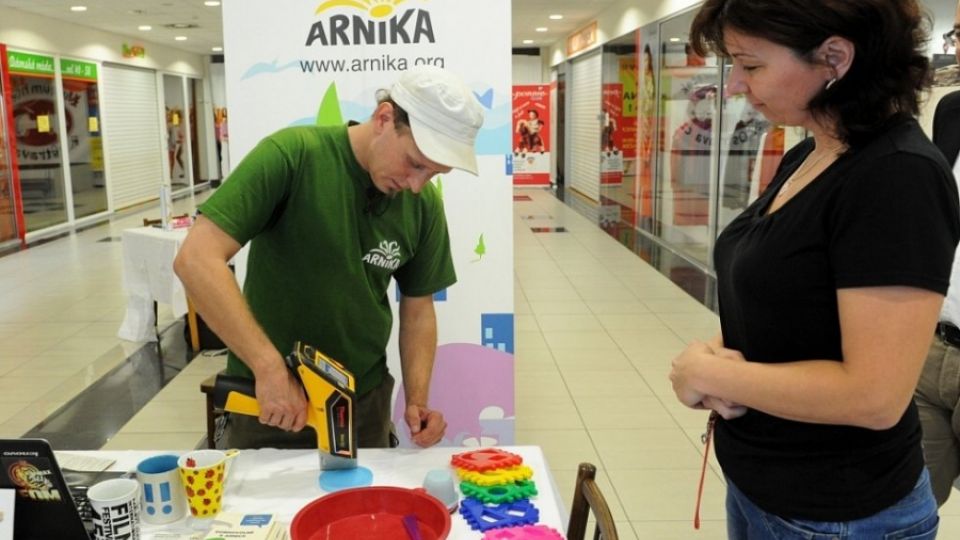Even in the Czech Republic, despite the ban on the use of phthalates in children's toys and the recent tightening of related European Commission regulations, there are occasional reports that these toxic substances have been detected, and not only in children's products. In Serbia, the regulation of phthalates is at a significantly lower level, something which a new Arnika project aims to change. The objective is a similar ban on phthalates to that in the EU and the protection of Serbian consumers against the dangerous effects of these and other toxic substances. Similarly as in the Czech Republic, efforts will also be made to promote the right to information on toxic substances and to strengthen the role of citizens in improving chemical safety.
Phthalates are mainly used as softeners in the production of plastics, especially in the widespread PVC. In addition to floor coverings, we can also find them in toys for children, printing on clothes, paints, pesticides, or cosmetics. In the Czech Republic, phthalates were banned in children's toys in 2001 on the basis of proof of their toxicity, and the European Union has further restricted their use in production since July 2020. "Unfortunately, this is not yet the case in Serbia, as in other non-EU countries. Although a good legislative framework for the regulation of chemicals has been established there, significant shortcomings in its practical implementation remain, including weaker regulation of phthalates. The chemical safety of products should be the norm in today's society. That is why we are working with non-governmental organizations in Serbia to enforce the same restrictions on phthalates as in the EU," says the head of Arnika’s Toxics and Waste programme, Jindřich Petrlík.
However, the project, financially supported by the Ministry of Foreign Affairs of the Czech Republic within the Transition Promotion Programme, aims to provide much more comprehensive assistance in solving this problem. In addition to the chemical analyses themselves, the project activities will also include research on the market and the quality of product labelling. "A big problem in Serbia is that for some products it is not clear what plastics they are made of, which of course leads to questions about what substances can be released from them when, for example, children play with them or wear them in the case of clothing," Petrlík explains. Another part of the project will be an analysis of the legal possibilities of involving the public in decision-making processes on chemical safety in Serbia and proposing steps for improvements to Serbian state institutions. "It may not look like it, but our project will also help the Serbian state administration, because it will bring a lot of new information about toxic substances in products sold in Serbia," he adds.
"Together with our partner organization ALHem [1], we have already managed to create a nationwide network of non-profit organizations which are dedicated to chemicals in products and will cooperate in the project. In the current situation, we consider this to be a promising development of the project," states Jan Šamánek from Arnika. Within the framework of this project, a webinar on the chemical safety of products was held for people from the established informal network, which also provided information about how Serbian NGOs can be actively involved in this activity.
Serbian organizations have now focused on collecting samples for analysis. These are mainly shoes and elements of toys for children or school supplies, all made of softened PVC. "Serbian children are also exposed to products that do not meet legal standards, and the same applies to household products. Especially a child's organism is the most susceptible to harm as a result of the negative effects of the chemicals," points out Petrlík.
With this year's project, Arnika continues with its previous activities in Serbia, focused not only on toxic substances in products, but also dedicated to, for example, toxic substances in the vicinity of the Serbian coal-fired power plant at Obrenovac.
The project is co-financed by the Transition Promotion Programme of the Ministry of Foreign Affairs of the Czech Republic, the IPEN network (International Network for the Elimination of Persistent Organic Pollutants), and the Global Greengrants Fund.

[1] ALHem is a Serbian non-governmental organization promoting sustainable development, in particular the safe handling of chemicals. The organization has been operating since 2013 and its team has extensive experience in the development and implementation of Serbian policies on chemicals and work within relevant public institutions. ALHem has implemented a "Serbia Substitute" project (funded by the Norwegian government) focused on safe alternatives to hazardous chemicals. ALHem is a member of the IPEN network and cooperates with relevant partners at the EU level.







